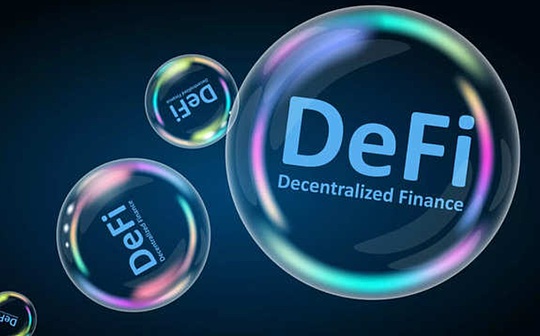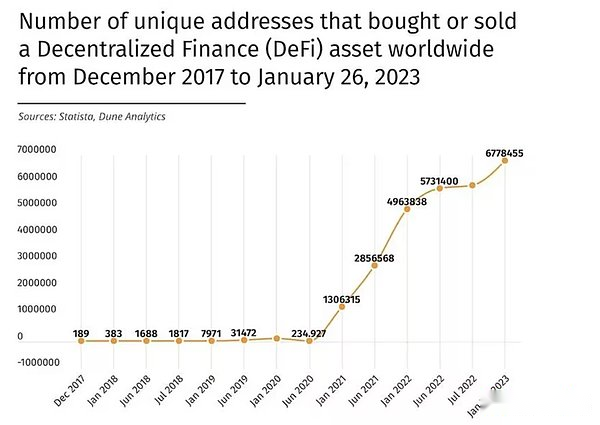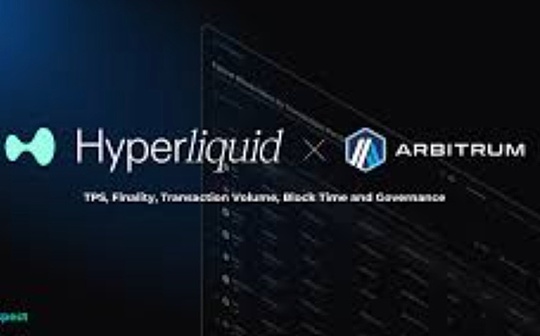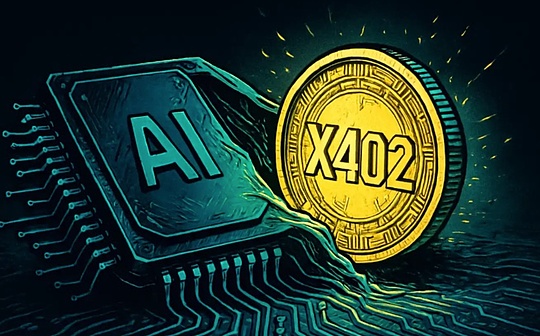
author:Thomas Gentle Source: Coindesk Translation: Shan Ouba, Bit Chain Vision World Realm
In the past few years, the global cryptocurrency supervision pattern has evolved rapidly, and the rapid pace of the formulation of regulatory rules is unlikely to slow down in the short term.Legislators are increasingly shifting from centralized cryptocurrency exchanges to decentralized finance (DAPPS).
The European Union has put pressure on DEFI through MICA legislation, forcing them to start KYC review on users, because only “real decentralization” projects are not regulated by MICA. In fact, most DEFI applications have organizations or individuals.Eventually control them.In addition, the European Commission’s goal is to release a complete report on DEFI risks and suggestions by the end of 2024.In the United States, SEC has begun to adopt law enforcement operations in the world’s largest DEX Uniswap.
With the increase of the number of DEFI participants (as shown in the figure below), the attention of regulatory agencies to the DEFI field is getting higher and higher.Although the specific nature of legislation in the future is still uncertain, it is certain that the basic principles of anti -money laundering (AML) and your client (KYC) will be applied to DEFI.
>
Regulatory agencies usually follow the standardized KYC framework to meet their regulatory requirements:
-
Confirm customer identity by file or non -file (customer recognition program/CIP).
-
Evaluate customer risks by scanning sanctions, political public figures (PEP), negative media lists, customer occupations, expected activities, etc.
-
Continuous monitoring whether the subsequent is included in the list of anti -money laundering monitoring, negative media list, and the peak of activities.
At present, each individual account opening will repeat all three steps of the KYC process.This requires individuals to submit the same files and information many times.Since opening a new bank account is not a frequent matter, customers usually do not strongly feel the inconvenience caused by repeating KYC.However, in DEFI, a person may interact with 10 or 15 protocols every day.It is required to complete KYC multiple times to cause frustration and turn DEFI into a digital version of traditional financial systems.
There is another choice: portable KYC.
DAPP now has a unique opportunity to achieve this, whether it is in the current environment that is basically not subject to supervision, or in the future, when the Defi specific AML/KYC regulations are promulgated in the future.In an unsure environment, public blockchain technology allows users to submit identity documents, screen their names according to the AML monitoring list, scan their chain activities to find AML risks, and store the proof of each check in theirIn the wallet.Users can then interact with the license DAPP, and their smart contracts can filter users who have not passed the KYC check.
This method is good for individuals because they do not need to endure the trouble of repeatedly submitting files.It also brings major benefits to DAPP to ensure that they will not risk the risks of violations of sanctions and money laundering. At the same time, they saves compliance personnel and system funds and against witch attacks.
DAPPs are bound by the AML/KYC regulations, which can use portable KYC to meet all aspects of its supervision obligations, similar to unsupering DAPP.However, the regulatory DAPP needs to fully access the underlying documentation of its customers to make decisions.Although customer documents cannot be stored on the public blockchain, regulatory entities can hire service providers to assist in fulfilling its aml/kyc obligations.Therefore, the portable KYC service provider can store customer documents and transmit it to the entity, so that it can decide whether to let users enter.
The upcoming DEFI protocol highlights the demand for innovative compliance solutions.Portable KYC provides a practical method to balance user convenience and regulatory requirements, so that DAPP can reduce compliance costs and reduce risks.Through preparing for now, the DEFI organization can ensure the smooth transition to a more regulatory future, thereby cultivating trust and toughness in the ecosystem.








